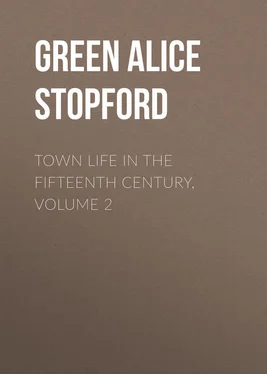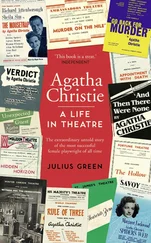Alice Green - Town Life in the Fifteenth Century, Volume 2
Здесь есть возможность читать онлайн «Alice Green - Town Life in the Fifteenth Century, Volume 2» — ознакомительный отрывок электронной книги совершенно бесплатно, а после прочтения отрывка купить полную версию. В некоторых случаях можно слушать аудио, скачать через торрент в формате fb2 и присутствует краткое содержание. Жанр: literature_19, foreign_antique, foreign_prose, Историческая проза, на английском языке. Описание произведения, (предисловие) а так же отзывы посетителей доступны на портале библиотеки ЛибКат.
- Название:Town Life in the Fifteenth Century, Volume 2
- Автор:
- Жанр:
- Год:неизвестен
- ISBN:нет данных
- Рейтинг книги:5 / 5. Голосов: 1
-
Избранное:Добавить в избранное
- Отзывы:
-
Ваша оценка:
- 100
- 1
- 2
- 3
- 4
- 5
Town Life in the Fifteenth Century, Volume 2: краткое содержание, описание и аннотация
Предлагаем к чтению аннотацию, описание, краткое содержание или предисловие (зависит от того, что написал сам автор книги «Town Life in the Fifteenth Century, Volume 2»). Если вы не нашли необходимую информацию о книге — напишите в комментариях, мы постараемся отыскать её.
Town Life in the Fifteenth Century, Volume 2 — читать онлайн ознакомительный отрывок
Ниже представлен текст книги, разбитый по страницам. Система сохранения места последней прочитанной страницы, позволяет с удобством читать онлайн бесплатно книгу «Town Life in the Fifteenth Century, Volume 2», без необходимости каждый раз заново искать на чём Вы остановились. Поставьте закладку, и сможете в любой момент перейти на страницу, на которой закончили чтение.
Интервал:
Закладка:
But for whatever reason the regulation of trade was thought desirable, whether to protect the consumer’s pocket or to fill the town treasury, it certainly was not intended to keep buyers and sellers at home, to hamper their enterprise, or to abolish competition. If protection and monopoly were allowed to look big, they were never allowed to get seriously in the way of business. In theory and sometimes in fact iron chains might be flung across the King’s highway, bars thrown athwart the river, and custom house officers set at the gate to levy toll and stallage. [110] Rep. on Markets, 61.
But gates and bars and chains swung open everywhere before the trader “if he have the penny ready to take to;” the guilds enlarged their rolls for foreigners, [111] In 1209 there were fifty-six foreigners in the Shrewsbury Guild; forty years later they had increased to 234. (Hibbert’s Influence and Development of English Gilds, 18.)
the towns granted them their privileges liberally. Since a man could hold citizenship in more than one borough a speculator or merchant doing business in a large way might always circumvent the rules against foreign dealers by being made citizen in some convenient trading centre as well as in his own town, [112] Many merchants of Lynn were made freemen of Canterbury and also admitted to the Brotherhood of the Monastery, by letters of fraternity which gave them a share in certain spiritual benefits. Is it possible that any trading privileges were connected with this?
and so obtain power to carry on the business proper to an alien speculator with all the privileges of a resident burgher. Every pedantic hindrance, indeed, was removed out of the way of his enterprise, for a very slight study of town records disposes of the idea that mediæval trade was ultimately governed by the formal laws of statute books. Monopoly was broken through whenever it was advisable or convenient for special occasions. Bakers and victuallers who rose to municipal offices turned the assize of bread and the inspection of cooking houses and fish stalls into an idle tale. In the hands of merchants the laws of buying and selling were manipulated so as to interfere neither with the free circulation of goods nor with the instinct of the dealer to buy in the cheapest market and sell in the dearest; and it was still left possible to carry food where it was most needed, whether to supply a manufacturing centre such as Norwich or a city which was rapidly doubling its population like London. [113] As far away as Nottingham oxen and sheep were forestalled and sold to butchers of London. Nott. Rec. iii. 48.
If the law ordained that the forestaller was to be heavily fined for the first offence; for the second to lose his merchandise and be put in the pillory; and for the third to be deprived of the freedom of the city, the law was simply ignored, or some trifling fine was inflicted – a paltry sum which a prosperous trader might easily disregard. [114] Leet Jurisdiction of Norwich (Selden Soc.), lxxiv.
In fact it would almost seem that the actual result of the trade laws was mainly to give the rich wholesale merchant an additional advantage over the poor trader. Forestalling and regrating became the fashionable privilege of town councillors and magnates who through their position and their wealth found it doubly easy to evade local ordinances, of London merchants who were buying all over the country to supply the needs of the growing city, and of dealers on a large scale interested in the export trade; while the terrors of the law served as an effective deterrent to struggling hawkers and chapmen against meddling with the profits won by more exalted speculators from a customary if illegal traffic.
The real foundation of free trade throughout the country, however, and that which alone gave any value to local arrangements and individual privileges, is to be found in the early town charters, where this great gift had a leading place. Almost the first boon asked for by a borough was a grant which should make its burghers or its merchant guild quit of tolls and pontage, and stallage and lastage, throughout the whole kingdom, in fairs and throughout sea-ports, in lands on this and on the other side of the sea; and give them power to buy and sell throughout all England, within cities and without, all kinds of merchandise; with the right to have stalls in other markets than their own without paying stallage, and to buy in such markets at all hours and not only those allowed to strangers. Each charter moreover had wrapped up in it a kind of “favoured nation” clause which gave to boroughs “such liberties as the city of London hath” – a clause which seems to have been interpreted (at least as to one of its meanings) as implying the right for burghers to buy and sell in gross in another town than their own on other than market days, and that “they may have in this respect as much liberty as the citizens of London.” [115] Select Pleas of the Crown (Selden Soc.), 88-9.
In its wide and unstinted privileges a charter such as this – the grant of a king who was lord of all fairs and markets – expressed the whole spirit of free trade; at a word local monopoly and protection in its true sense were swept away, and every market in the country opened to any trader duly enrolled as a burgher or a member of the Merchant Guild. The question indeed still bristled with difficulties. As the king was constantly giving away or selling his rights, or part of his rights, over markets, there were innumerable cases when the special grant to one town to hold a market without disturbance, and the more general license to its neighbour to consider itself free of all market dues, were wholly irreconcilable; and the law held that no charter of freedom could interfere with any earlier rights granted to any other person or corporation to levy tolls on transport, on crossing a bridge, on entering a gate, on taking up a standing in the market, or the like. In cases where two charters were found to bestow conflicting rights, therefore, the towns set their best lawyers to search out old evidences and records, and to claim the protection of judges of the King’s Bench or of Parliament for the grant that boasted of the greater age. [116] Case of the Abbot of Westminster against Southampton. Rot. Parl. i. 20-21. Trial before the King’s Bench at Westminster in 1201 where the Burgesses of Northampton claim that unjust toll is taken from them by the Abbot of Thorney, which he defends by virtue of custom and an older charter than Northampton. Select Civil Pleas (Selden Soc.), i. 11. See a case at Plymouth, 1495; Hist. MSS. Com. ix. 273. Leicester and Nottingham; Ibid. viii. 416-417. Southampton and Bristol; Report on Markets, 56. Winchester; Ibid. 55. See also Ibid. 62; Gross, ii. 257-8; 177-182; 147; 379. A merchant from the Cinque Ports who insisted on the privilege of burgesses to pay no toll with regard to some wool in Blackwell Hall, in the time of Henry the Eighth, had to defend his rights and won his case.
The preliminary question of priority of rights having been thus decided, the next step was to remedy the dead-lock of business to which the two communities had been brought by means of formal treaties such as nations make to-day, in which the right to levy toll and custom was probably used as systems of tariffs have been used in modern states – as a means of bribing or threatening refractory neighbours into some concession of free trade. [117] Retaliation in taking of toll is expressly mentioned in the charter of London. Stubbs’ Select Charters, 104.
Southampton made its separate treaties with at least seventy-three towns or trading corporations besides all the “honours” of the kingdom, releasing them from payment of its tolls and customs; its burghers had their own compact with Marlborough [118] 1238. Gross, ii. 173-174.
in which they waived such privileges as they possessed by their own earlier charter; with Bristol they settled the amount of the tax to be levied on Bristol men who brought merchandise to their market; they agreed with the men of Winchester that no tolls should be asked on either side; [119] Gross, ii. 256.
and in 1501 their treaty with the Cinque Ports was ratified by “your lovers the bailiff and jurats of Hastings.” [120] Hist. MSS. Com. xi. 3, p. 16. For agreement between Southampton and Portsmouth 1239, Marlborough 1239, Bristol 1260, Netley Abbey 1288, Bishop of Winchester 1312, Lymington 1324, New Sarum 1329, Coventry 1456, see Davies’ Southampton, 225-228; Abbot of Westminster Rot. Parl. i. 20-21. Other instances Rep. on Markets, 40-41. Select Civil Pleas (Selden Soc.), i. 11. Nottingham Rec. i. 55, ii. 349, 362. Gross, ii. 389-90, Hist. MSS. Com. ix. 212.
Undermined as they were on all sides, and with gaping breaches everywhere, the walls of protection which the boroughs had thrown up round their markets certainly formed no impediment to the movement of local trade. Before the impatience of traders greedy for gain, artificial frontiers and barriers and tariffs were swept away, and from little self-contained communities where the cottagers grew their own food and spun their own wool and asked scarcely anything from outside save fish and salt and a little iron, the boroughs grew rapidly into centres of expanding commerce. To supply their needs or their luxuries they despatched their traders far and wide. When Ely sent for John of Gloucester, the famous bell-founder, to make the four great bells for the cathedral, messengers had to go to Erith for clay, and to Lynn and Northampton for copper and tin. [121] Journ. Arch. Ass. xxvii. 416-7. When a gun was made for Lydd, metal for it was bought at Winchelsea and Hastings. (Hist. MSS. Com. v. 516-517, 521.) The Nottingham founder sent to Lincolnshire for his bell metal. (Nott. Rec. ii. 143, 145).
The Nottingham goldsmith was employed to repair the cross in Clifton Church, and its “alablaster man” supplied the faithful in London with little statues of the Baptist in appropriate shrines. [122] Ibid. ii. 179; iii. 19, 21, 29.
Buyers of wool and sellers of cloth, saddlers, butchers, fishmongers, hawkers of all sorts, obtained from the mayor and commonalty of their borough letters of free passage throughout the kingdom for the carrying on of their business [123] Hist. MSS. Com. viii. 414.
and kept up incessant intercourse between town and town. Everywhere busy forestallers were on the look out for eggs and meat and corn, and bought up supplies all over the country for London or some big town or for the export trade, or turned their privileges under the clause of London liberties into a means of buying wholesale all the week long as regrators in order to sell at a profit on market day, while on that day itself they were out at cock-crow to buy privately when the citizens were at mass, so that by six o’clock there was nothing left in the market for the good folk of the town. [124] Select Pleas of the Crown (Selden Soc.), i. 89. Rep. on Markets, 50-52.
Интервал:
Закладка:
Похожие книги на «Town Life in the Fifteenth Century, Volume 2»
Представляем Вашему вниманию похожие книги на «Town Life in the Fifteenth Century, Volume 2» списком для выбора. Мы отобрали схожую по названию и смыслу литературу в надежде предоставить читателям больше вариантов отыскать новые, интересные, ещё непрочитанные произведения.
Обсуждение, отзывы о книге «Town Life in the Fifteenth Century, Volume 2» и просто собственные мнения читателей. Оставьте ваши комментарии, напишите, что Вы думаете о произведении, его смысле или главных героях. Укажите что конкретно понравилось, а что нет, и почему Вы так считаете.












